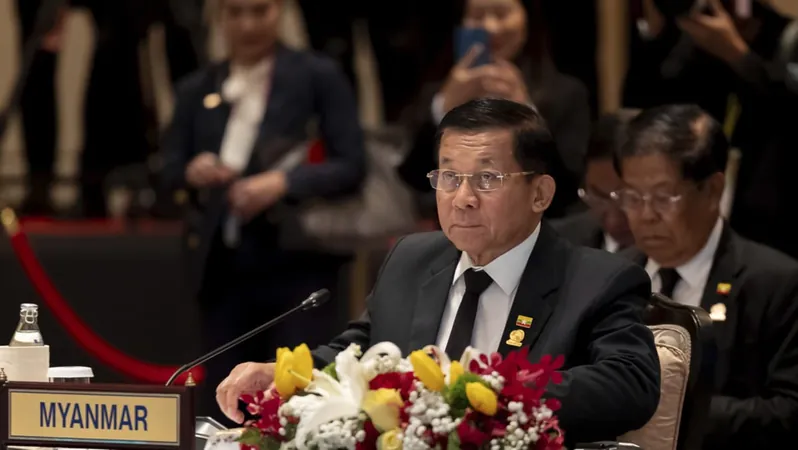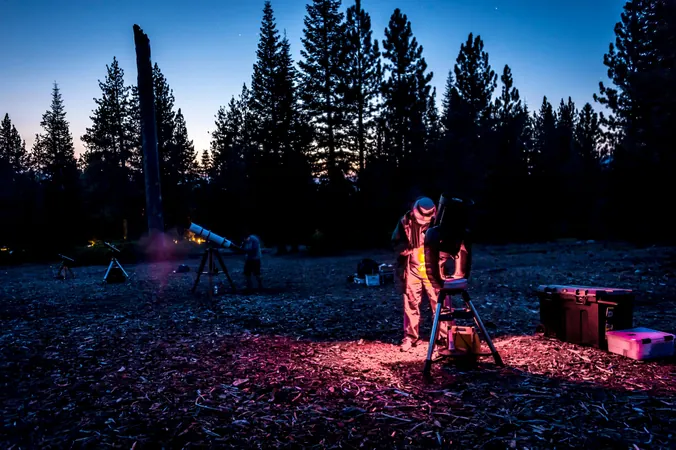
Myanmar's Junta Leader Engages with Foreign Leaders Amid Aid Crisis Following Devastating Earthquake
2025-04-05
Author: Sarah
Diplomatic Engagement Amid Crisis
In a rare diplomatic engagement, Myanmar's junta chief Min Aung Hlaing met with Indian Prime Minister Narendra Modi and Thai Premier Paetongtarn Shinawatra during a regional summit in Bangkok on April 4, 2025. This encounter comes at a time when the United Nations has reported that the country's military is severely restricting humanitarian aid following a catastrophic earthquake that has resulted in over 3,100 fatalities amid ongoing civil war.
Aftermath of the Earthquake
The 7.7-magnitude earthquake struck on March 29, devastating regions already grappling with the consequences of a coup that ousted the democratically elected government in 2021. In the aftermath of the tragedy, Min Aung Hlaing attempted to leverage this opportunity for diplomatic discussions to ease Myanmar's international isolation.
Call for Ceasefire
During their discussions, Modi emphasized the necessity for a permanent ceasefire, echoing the sentiments of many who are urging political resolution to the conflict ravaging Myanmar, a country of 55 million people. The Indian foreign ministry emphasized that an inclusive and credible electoral process is crucial for the country's stability.
United Nations Concerns
In response to the earthquake's aftermath, which includes more than 4,500 injuries and hundreds missing, the junta declared a temporary ceasefire until April 22 against its armed adversaries. However, the United Nations has documented ongoing military operations, including airstrikes targeting areas opposing the junta, which raises concerns about the authenticity of the ceasefire.
International Response
UN Secretary-General Antonio Guterres described this situation as a "tragic moment," urging global efforts to transform this disaster into a chance for the people of Myanmar to find resolution and peace. The UN’s aid chief, Tom Fletcher, is scheduled to visit Myanmar, signaling the international community’s commitment to addressing the humanitarian plight exacerbated by both the earthquake and the ongoing conflict.
Aid Limitations
While neighbors such as China and India, along with several Southeast Asian nations, have started sending aid, frustrations are mounting as the junta has reportedly limited access to affected regions, especially where local populations resist military rule. Recent governmental actions have further complicated recovery efforts as severe weather conditions threaten to trigger disease outbreaks among survivors.
Health Concerns
The potential rise in cholera cases is particularly concerning, as many quake victims are stranded in makeshift shelters in Mandalay, Sagaing, and Naypyitaw, making sanitation and healthcare access critical. The situation, which was already dire due to Myanmar’s civil war, has become increasingly precarious as the monsoon season approaches.
Political Implications
Meanwhile, the junta had been pursuing an election slated for December, a move widely critiqued as a façade to maintain military power. During the summit, discussions on disaster relief and prevention made headlines, and Thai officials are set to visit Myanmar to explore further collaboration. Analysts suggest that these interactions represent a strategic shift as regional powers assess the evolving dynamics of Myanmar's political landscape.
Looking Ahead
The region continues to watch closely as a complex interplay of humanitarian need, political strife, and international diplomacy unfolds. The potential fallout from this earthquake could significantly reshape Myanmar's trajectory amidst the ongoing struggle for peace and stability.


 Brasil (PT)
Brasil (PT)
 Canada (EN)
Canada (EN)
 Chile (ES)
Chile (ES)
 Česko (CS)
Česko (CS)
 대한민국 (KO)
대한민국 (KO)
 España (ES)
España (ES)
 France (FR)
France (FR)
 Hong Kong (EN)
Hong Kong (EN)
 Italia (IT)
Italia (IT)
 日本 (JA)
日本 (JA)
 Magyarország (HU)
Magyarország (HU)
 Norge (NO)
Norge (NO)
 Polska (PL)
Polska (PL)
 Schweiz (DE)
Schweiz (DE)
 Singapore (EN)
Singapore (EN)
 Sverige (SV)
Sverige (SV)
 Suomi (FI)
Suomi (FI)
 Türkiye (TR)
Türkiye (TR)
 الإمارات العربية المتحدة (AR)
الإمارات العربية المتحدة (AR)